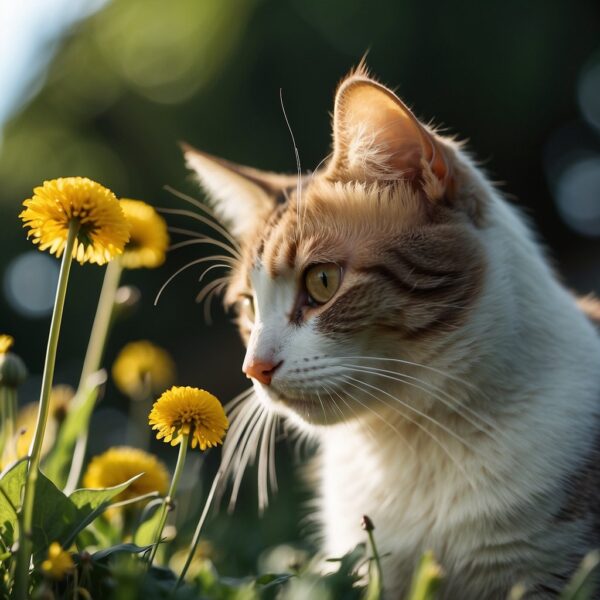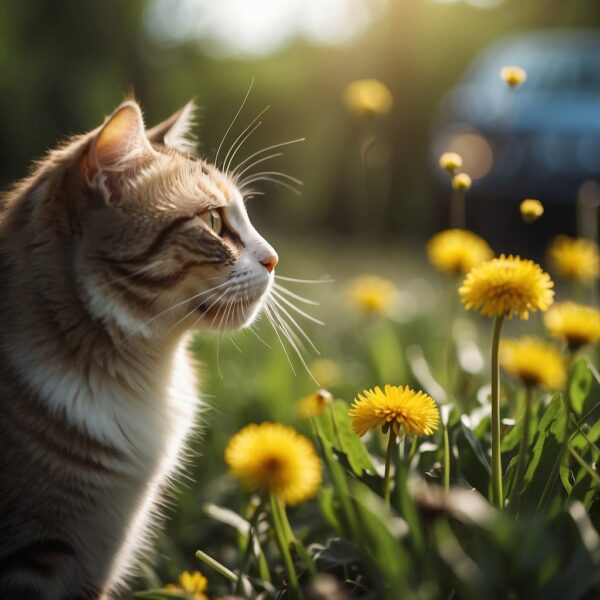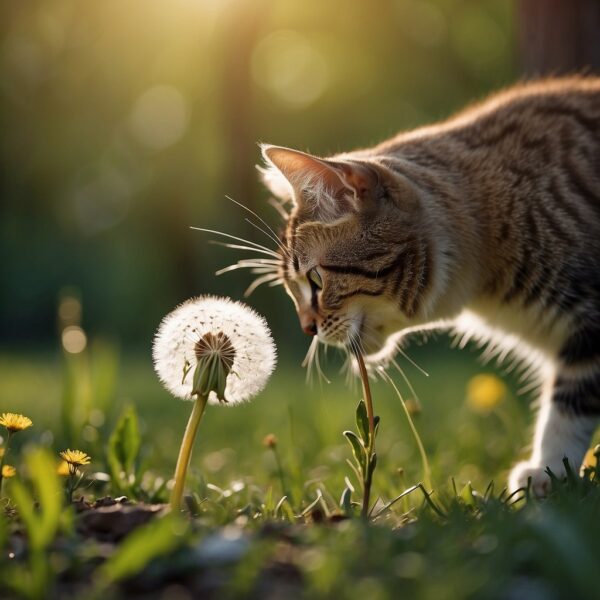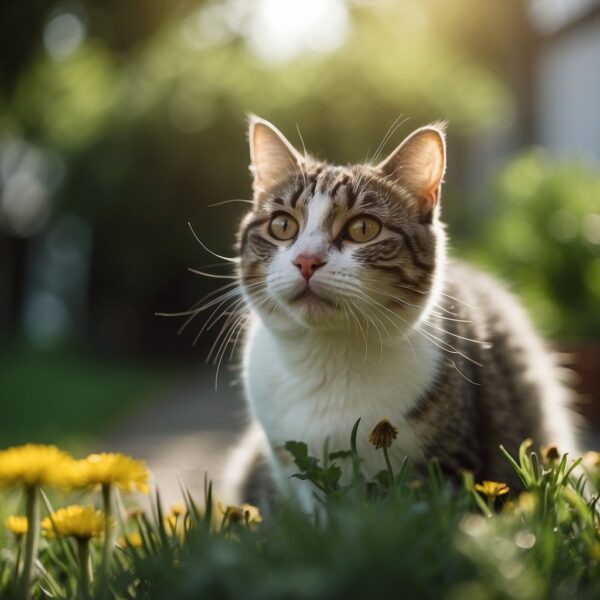
Are Dandelions Safe for Cats
Cat parents often explore natural dietary supplements that could benefit their pets, and dandelions have recently become a topic of interest in the feline nutrition conversation. As common plants that pop up in backyards and parks, dandelions are more than just weeds; they possess a range of vitamins and minerals. This has led to the question: Are dandelions safe for cats to consume?
Dandelions are safe for cats and can be eaten in moderation, with some potentially positive effects on their digestion and nutritional intake. The plant is a source of vitamins A, D, B, as well as minerals like iron and calcium, which can support a balanced diet for cats. However, safety concerns do arise when considering the source of the dandelions, as those treated with pesticides or herbicides are harmful to cats. It is essential to ensure dandelions are clean and free from such chemicals before allowing a cat to consume them.
While the non-toxic nature of dandelions suggests a green light for feline consumption, it is advisable to consult a veterinarian before making any changes to a cat’s diet. A professional can provide tailored advice, taking into account the cat’s specific health needs and dietary requirements. Understanding the properties of dandelions and assessing the potential risks is an important step in responsibly incorporating this plant into a cat’s diet.
Key Takeaways
- Dandelions are safe for cats to consume in moderation and offer a variety of vitamins and minerals.
- Ensure dandelions are free of pesticides and herbicides before allowing a cat to eat them.
- Consult a veterinarian for personalized guidance before adding dandelions to a cat’s diet.
Safety Profile of Dandelions for Cats
Dandelions are widely recognized as safe and non-toxic for cats, offering various health benefits when consumed in moderation. It’s essential to distinguish these from toxic plants that could harm feline health.
General Safety of Dandelions
Dandelions are generally considered safe for cats to consume. They contain none of the harmful compounds found in certain toxic plants that can cause symptoms like vomiting or diarrhea in felines. However, it is crucial that dandelions are free from pesticides or herbicides that could otherwise pose risks.
- Safety: Non-toxic to cats
- Precaution: Ensure dandelions are pesticide-free
Potential Health Benefits for Cats
The nutritional profile of dandelions can be beneficial for a cat’s diet. Rich in vitamins and minerals, these plants may support proper digestion and overall well-being when given as a supplement to a cat’s regular diet.
- Nutritious Components: Vitamins (including Vitamin A), minerals (such as calcium and iron)
- Health Benefits: May aid in digestion and provide essential nutrients
Understanding Non-Toxic Plants
Identifying non-toxic plants, like dandelions, is vital for cat parents to prevent accidental poisoning. Familiarity with plants that are safe for feline consumption can help guardians integrate healthier, diverse components into their cat’s diet.
- Non-Toxic: Dandelions are not poisonous to cats
- Knowledge: Awareness of non-toxic versus toxic plants is important for cat safety

Understanding Dandelions and Their Properties
Before introducing dandelions to a cat’s diet, understanding their botanical aspects and chemical composition is crucial for assessing their safety and potential health benefits.
What Are Dandelions?
Dandelions, known scientifically as Taraxacum officinale, are perennial plants widely recognized by their yellow flower heads and fluffy seed balls that appear after flowering. Often labeled as weeds, these plants are ubiquitous in yards and parks, resilient to various environmental conditions.
Chemical Composition of Dandelions
Nutritional Value: Dandelions are a source of various nutrients essential for overall health. Here’s a breakdown of their key components:
- Vitamins: Dandelions are rich in vitamins A, C, and K.
- Minerals: The plant provides minerals such as calcium, potassium, iron, and manganese.
- Fiber: It contributes to dietary fiber, which aids in digestion.
- Protein: While not abundant, dandelions do contain small amounts of protein.
Each part of the dandelion—from flower to root—holds these nutritional elements, making it a plant with potential health advantages when consumed properly. However, the degree of nutrients may vary depending on the plant’s condition and the environment in which it grows.
Dandelions are safe for cats: Assessing the Risks
While dandelions can be a nutritious snack for cats, it’s crucial to consider potential risks before letting a pet consume them. Specifically, the application of pesticides and herbicides, as well as the possibility of adverse reactions, need to be addressed for a cat’s safety.
Risks of Pesticides and Herbicides
Pesticides and herbicides are chemicals used to kill or control pests and weeds which may contaminate dandelions in gardens and lawns. These substances can be harmful to cats if ingested and can lead to gastrointestinal upset, among other health issues.
- Chemicals: Exposure to these can cause vomiting, diarrhea, and lethargy in cats.
- Precaution: Always ensure dandelions are free from such chemicals before allowing a cat to consume them.
Signs of Adverse Reactions
Cats can exhibit various signs of adverse reactions if they consume something harmful. When it comes to dandelions that may be contaminated or if the cat has underlying allergies, watch for the following symptoms:
- Vomiting & Diarrhea: Indications that the digestive system is irritated.
- Lethargy: A noticeable decrease in energy levels may signal a health concern.
Should these symptoms appear, it’s crucial to consult with a veterinarian immediately to ensure the cat receives proper care and attention.

Feeding Guidelines for Cat parents
When considering dandelions for a cat’s diet, guardians should focus on safe incorporation, appropriate quantities, and alternatives that offer similar benefits.
Incorporating Dandelions in a Cat’s Diet
Dandelions can be introduced to a cat’s diet as a natural source of fiber and vitamins. Cat parents should ensure the dandelions are free of pesticides and other chemicals. Additionally, starting with small amounts will allow guardians to observe how their cat reacts to this new addition.
Recommended Quantity and Frequency
Moderation is key when feeding cats dandelions. They should be given as an occasional treat, not a regular meal replacement.
- Frequency: Introduce dandelions no more than once a week.
- Quantity: A few leaves or a small sprinkling of dandelion root should suffice.
Parents should monitor their cats for any signs of digestive upset and reduce frequency or stop feeding dandelions if adverse reactions occur.
Alternatives to Dandeloids
For variety or if dandelions are not well-received, cat parents can consider other safe herbs as dietary enhancers.
- Catnip: Offers enjoyment and can act as a digestive aid.
- Valerian Root: Arouses interest in cats similar to catnip, sometimes used as a treat or dietary supplement.
When introducing any dietary change, parents should pay attention to their cat’s preferences and observe for any changes in their health or behavior.
Roles of Veterinarians and Professional Advice
Veterinarian input plays a critical role in guiding cat parents about the suitability of dandelions in a cat’s diet, emphasizing on professional research to ascertain health benefits and spot potential risks such as upset stomach or kidney disease.
Dandelions are safe for cats: Veterinarian Research
Veterinarian research is fundamental in establishing the safety and health benefits of dandelions for feline health. Such research draws from scientific methods to ensure information is current and up-to-date, directly impacting recommendations made to cat parents. Studies led by veterinarians might, for example, detect the presence of vitamins and minerals that are beneficial for cats, such as iron and Vitamin A. Concurrently, research helps identify any adverse reactions that dandelions might cause, offering a balanced view on their inclusion in a cat’s diet.
When to Consult a Veterinarian
A cat parent should consult with a veterinarian:
- Before introducing dandelions to a cat’s diet, especially if the cat has pre-existing conditions like kidney disease.
- If the cat exhibits signs of an upset stomach or other adverse reactions after consuming dandelions.
- To gain tailored advice on serving size and frequency to align with their pet’s specific dietary needs.
Professional advice is crucial, as it is personalized to an individual cat’s health and wellbeing, ensuring that even broadly safe practices are fine-tuned for optimal feline health.

Frequently Asked Questions about cats and dandelions
In this section, we address common inquiries related to the safety and benefits of dandelions in a feline’s diet. These FAQs are designed to provide clear, concise information for cat parents.
Can felines consume dandelion greens without harm?
Dandelion greens are non-toxic to cats and can be consumed safely in moderation. They should be free of pesticides and herbicides to ensure they do not pose a health risk.
Is it safe for my cat to drink dandelion root tea?
While dandelion root tea is often consumed by humans for its health benefits, it is not typically recommended for cats due to the lack of research on its safety and proper dosage for felines.
Are there any benefits to cats eating dandelions?
Dandelions are rich in vitamins, such as A, D, B, and minerals like iron and calcium, which may contribute positively to a cat’s diet. However, any potential health benefits should be discussed with a veterinarian.
What part of the dandelion, if any, is harmful to cats?
No part of the dandelion has been identified as harmful to cats. It is, however, crucial to ensure that the dandelions have not been treated with chemicals that could be toxic.
How should dandelion be administered to cats for medicinal purposes?
Dandelion may sometimes be recommended by holistic veterinarians as a dietary supplement. These professionals can provide guidance on proper administration and dosage.
What are the risks of allowing my cat to eat dandelions from the garden?
Allowing cats to consume dandelions from the garden poses a risk if the plants have been exposed to pesticides or herbicides. It is important to verify that the dandelions are chemical-free before consumption.